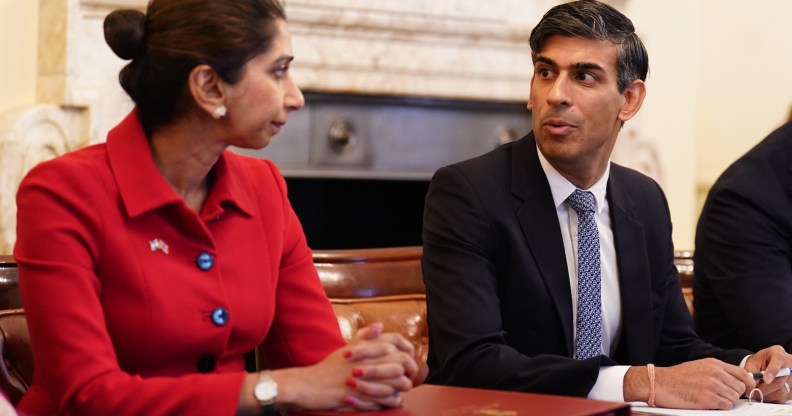Just one per cent of UK voters say trans people will matter in 2024 general election

Suella Braverman and Rishi Sunak have both used their political platform to mock and attack trans people. (Credit: Getty Images)
Just one per cent of voters say trans rights will determine their vote in the general election, new research on culture wars and politics has shown.
Members of the Conservative party have already said the party intends to fight the next election on “trans debate and culture wars” – but they’ll be disappointed to hear such subjects are highly unlikely to affect how the majority of people cast their vote.
The findings are part of long-running research by the Policy Institute at King’s College London and Ipsos UK, based on a series of representative surveys using the latter’s online random probability KnowledgePanel.
The study looked at the state of culture war debates, divisions, and politics in the UK, and examined how the public’s views and attitudes change in short periods of time.
Current examples of culture wars include attacks on transgender rights – specifically with regard to single-sex spaces and women’s sport – refugees and migration, and equality, diversity and inclusion policies – in other words, the “woke agenda”.
The most recent research sampled 3,716 adults aged 16 and older across the UK between 17 and 23 August, following previous surveys of 2,931 adults between 13 and 19 January 2022, and 2,834 between 25 November and 2 December 2020.
The research revealed just one per cent of the public say trans rights will be a main issue they will consider when voting, compared with topics such as asylum seekers (13 per cent), the cost of living crisis (43 per cent) and the NHS (28 per cent).
It also showed 62 per cent of those surveyed now believe politicians “invent or exaggerate” culture wars as a political tactic. This is an increase of 18 percentage points since 2020.
At the same time, more than half of those surveyed (56 per cent) said they believe politicians who talk about divisions over cultural issues are attempting to distract voters from other important topics.
However, the research is not quite as clear cut as it might seem, with people still far more likely to see culture wars as a real-life problem (49 per cent) rather than one that only exists in the mainstream media and online via social media (22 per cent).
However, for the first time ever a majority (52 per cent) now say culture wars are a serious problem for UK society and politics.
‘No one really wins a culture war’
One example the research found was the changing attitudes towards the word “woke”, with 42 per cent of those surveyed saying they would consider it an insult if someone described them as such. This is a rise from 2021 when 36 per cent said the same, and 2020, with 24 per cent then saying it was insulting.
On the other hand, figures relating to people who would treat being called woke as a compliment have remained steady: 27 per cent in 2023 compared to 26 per cent in both the previous sample years.
Meanwhile, at 21 per cent, men are twice as likely as women to say they are anti-woke. Twenty-four per cent of respondents aged 55 and older are likely to say the same, but that figure drops dramatically, to just six per cent, for those in the 16-to-24 age bracket.
Professor Bobby Duffy, the director of the Policy Institute at King’s College London, said the “speed and scale” of the UK’s adoption of culture war issues has been one of the key trends of the past few years.
“When we started the series in 2020, half the public hadn’t even heard the term ‘cancel culture’. Now, [on average] four in 10 say they’ve heard a lot about it. Opinions have changed quickly too, with a near doubling of people seeing ‘woke’ as an insult, and even ‘anti-woke’ – a term that didn’t really exist before 2019 – becoming something people identify with, including three in 10 older men, and four in 10 Conservative-Leave voters.
“But opinion is also swinging against the use of these identity divisions, with one of the biggest shifts being the increase in the public’s perception that politicians are inventing or exaggerating culture wars as a political tactic.
“The evidence suggests it may not be a particularly successful approach to an election, as tiny minorities pick out culture-war-related issues as important to how they’ll vote.
“But the key concern here is not election outcomes. The real worry is that true US-style culture war divisions, where our views on a range of social issues become very tightly tied to our political identity, leave no room for compromise and are incredibly difficult to unpick once they become established.
“No one really wins a culture war, so it’s best not to start [one].”
How did this story make you feel?

